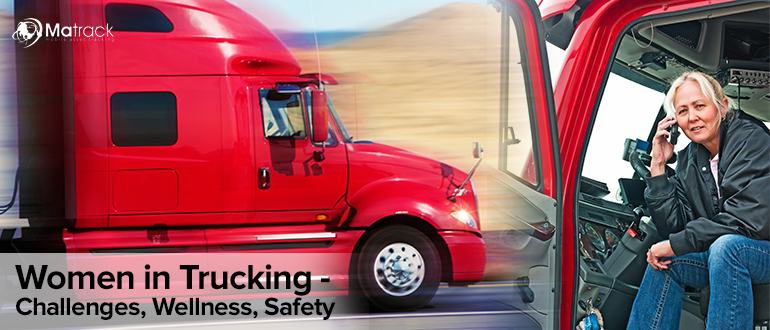Key Takeaways:
- Women in trucking face gender discrimination, workplace harassment, and a lack of proper facilities, making the industry challenging for them.
- These challenges impact their physical and mental wellness, as long hours, isolation, and poor health options create additional struggles.
- Safety remains a major concern, with risks of harassment and assault requiring strong company policies and personal safety measures.
- Despite these issues, the trucking industry is evolving with inclusive hiring, better infrastructure, and support programs to empower women drivers.
Challenges Faced by Women in Trucking
Although more women are entering trucking, they still struggle with obstacles that their male counterparts rarely face. These challenges include gender discrimination, workplace harassment, and inadequate facilities.
Gender Discrimination and Stereotypes
Trucking has been historically seen as a “man’s job.” Many women face resistance from male colleagues, employers, and even customers who doubt their capabilities. Common stereotypes include:
- Physical Strength Bias – The misconception that women are not strong enough to handle long-haul driving, loading, and maintenance tasks.
- Skill Doubts – Assumptions that women are not as skilled at handling large commercial vehicles.
- Career Longevity – Doubts about a woman’s ability to sustain a long-term career in trucking.
Women truckers often find themselves needing to work twice as hard to prove their competence.
Workplace Harassment and Isolation
Harassment is a serious issue in the trucking industry. Many female drivers report experiences of verbal abuse, unwanted advances, and even threats from coworkers, customers, and strangers at truck stops.
- A 2021 survey by Women in Trucking (WIT) revealed that over 60% of female truckers have experienced harassment at some point in their careers.
- The solitary nature of trucking can make it difficult for women to seek help or report misconduct.
Companies must take stronger actions to implement zero-tolerance policies and offer better support systems for female drivers.
Limited Facilities and Accommodations
Truck stops, restrooms, and sleeping quarters are often designed with men in mind, leaving female truckers struggling to find safe and clean facilities on the road.
- Many truck stops lack separate showers and restrooms for women.
- Safe overnight parking is limited, making women more vulnerable to theft, assault, and harassment.
- Trucks are typically built for male ergonomics, leading to discomfort for women of smaller stature.
Addressing these issues requires investment in better infrastructure, including safe truck stops and gender-inclusive vehicle designs.
Wellness for Women Truckers
Long-haul trucking is physically and mentally demanding. Maintaining good health and wellness is crucial for female drivers who spend long hours on the road.
Physical Health Challenges
Driving for extended periods can lead to various health problems, including:
- Obesity and Poor Diet – Limited access to healthy food options at truck stops leads to increased risks of obesity, diabetes, and heart disease.
- Back and Joint Pain – Sitting for long hours, combined with improper seat ergonomics, can cause chronic back and joint issues.
- Fatigue and Sleep Deprivation – Irregular schedules and long shifts disrupt sleep patterns, leading to increased fatigue.
Wellness Solutions:
- Pack healthy meals to avoid dependence on fast food.
- Stretch and exercise during breaks to prevent stiffness and pain.
- Invest in ergonomic seat cushions and proper lumbar support.
- Follow a consistent sleep schedule to minimize fatigue.
Mental Health and Emotional Well-Being
Women in trucking experience higher stress levels due to isolation, discrimination, and safety concerns. Loneliness and depression are common among long-haul female drivers.
Mental Health Strategies:
- Stay connected with family and friends through video calls, podcasts, and social media.
- Join women trucking communities for support and networking.
- Practice mindfulness through meditation or deep breathing exercises.
- Seek therapy if feelings of isolation and stress become overwhelming.
Employers should offer mental health support programs and provide resources for female drivers facing emotional challenges.
Safety Measures for Women Truckers
Safety is a top concern for women in trucking, as they face higher risks of harassment, theft, and assault. Implementing safety measures can help female truckers feel secure while on the road.
Personal Safety Tips for Female Truckers
Women truckers must take extra precautions to protect themselves, especially when traveling alone.
Key Safety Strategies:
- Park in well-lit areas and avoid isolated truck stops at night.
- Lock truck doors at all times and install security alarms.
- Carry self-defense tools such as pepper spray or a personal alarm.
- Be cautious with personal information and avoid sharing travel details with strangers.
- Use trucking apps like Trucker Path to find safer parking areas and trusted truck stops.
Company Safety Policies and Support
Trucking companies should prioritize safety by implementing stronger policies and providing safety training for female drivers.
- GPS tracking and emergency response systems should be installed in all trucks.
- Self-defense training programs should be offered to women truckers.
- Reporting systems for harassment and safety incidents should be anonymous and effective.
- Mentorship programs can help connect experienced women drivers with newcomers for guidance and support.
Companies that take safety seriously retain more female drivers and improve overall workplace satisfaction.
The Future of Women in Trucking
The trucking industry is slowly becoming more inclusive, but there is still a long way to go. With increasing awareness, better safety measures, and wellness programs, more women are considering careers in trucking.
Industry Changes and Opportunities
Trucking organizations are now focusing on recruiting more women and making the profession more accessible. Positive changes include:
- More inclusive hiring policies by trucking companies.
- Scholarships and training programs to encourage women to join the industry.
- Advocacy groups like Women in Trucking (WIT) pushing for workplace equality.
Technology is also making trucking safer and more efficient for women, with automated trucks, better GPS systems, and improved vehicle ergonomics helping drivers navigate challenges.
Encouraging More Women to Join the Industry
To attract more women to trucking, companies need to:
- Highlight success stories of female truckers to inspire new recruits.
- Offer equal pay and fair promotions for women drivers.
- Create a more supportive and harassment-free workplace.
By breaking down barriers, trucking can become a more diverse and welcoming industry for everyone.
Conclusion
Women in trucking continue to face challenges, but the industry is gradually evolving. Addressing gender discrimination, improving wellness, and implementing stronger safety measures will make trucking a better career choice for women.
As more women take the wheel, they are proving that trucking is not just a man’s job—it is a field where anyone with skill and determination can succeed. The future of trucking is more diverse, inclusive, and empowering for women who choose to hit the road.



